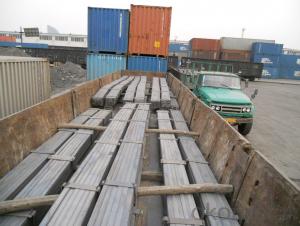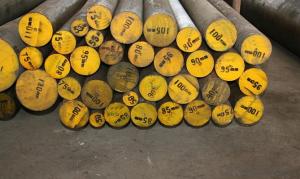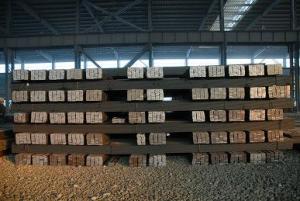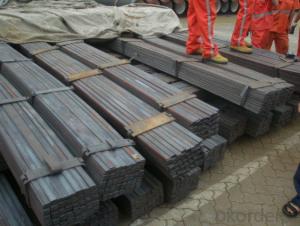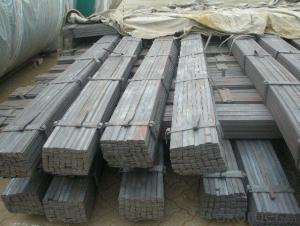Grade AISI6150 CNBM Hot Rolled Spring Steel bar
- Loading Port:
- Shanghai
- Payment Terms:
- TT or LC
- Min Order Qty:
- 25 m.t.
- Supply Capability:
- 10000 m.t./month
OKorder Service Pledge
OKorder Financial Service
You Might Also Like
Specification
Specifications of Steel Round Rod Bar:
1. Produce Standard: GB, AISI, ASTM, SAE, EN, BS, DIN, JIS
2. Produce processes: Smelt Iron -EAF smelt Billet - ESR smelt Billet -Hot rolled or forged get the steel round bar and plate
3. Heat treatment: Normalized / Annealed / Quenched+Tempered
Available Specification | |||
Round Bar | Diameter (mm) |
| Length (mm) |
5-1500 |
| 2000-5800 | |
Plate | Thickness (mm) | With (mm) | Length (mm) |
20-1000 | 200-1500 | 2000-5800 | |
The specification can be customised | |||
Chemical Composition:
Grade | C | Si | Mn | P | S | Cr | Ni | V |
AISI 6150 | 0.48-0.53 | 0.15-0.35 | 0.70-0.90 | ≤0.035 | ≤0.050 | 0.80-1.10 | — | ≥0.15 |
DIN 51CrV4 | 0.47-0.55 | ≤0.40 | 0.70-1.10 | ≤0.035 | ≤0.035 | 0.90-1.20 | — | 0.10-0.25 |
BG 50CrV | 0.46-0.54 | 0.17-0.37 | 0.50-0.80 | ≤0.030 | ≤0.030 | 0.80-1.10 | ≤0.035 | 0.10-0.20 |
Usage and Applications:
Advanced spring steel , used for important spring with a large cross-section and high load,and the valve spring, piston, spring, the relief valve spring with working temperature below 300 ℃ .
Packaging & Delivery:
Packaging Detail: Standard seaworthy packing or as customer required; all goods are packed in bundle with steel strips and shipped by break bulk vessel or container
Delivery Detail: 45 days
Production Flow:
EAF+LF+VD+ Forged+ Heat Treatment
Material prepare (billet) — heat up — rough rolling — precision rolling — cooling — packing — storage and transportation
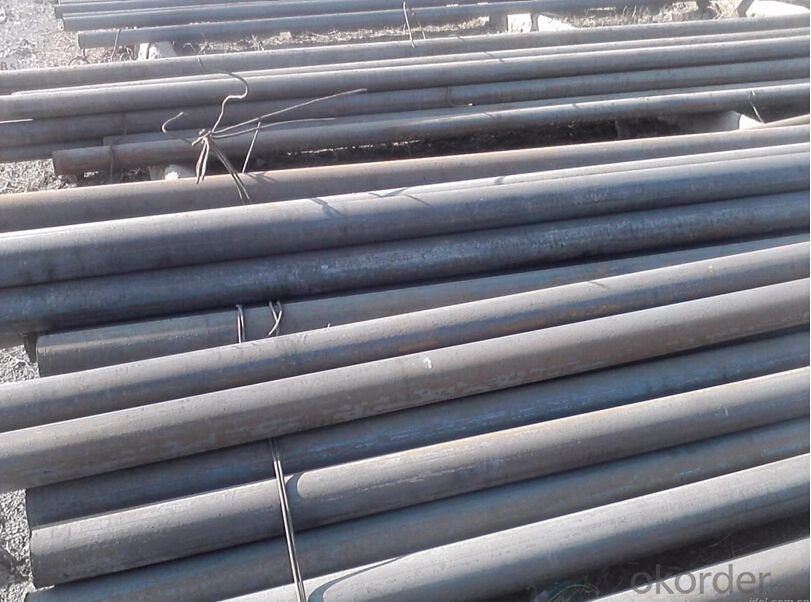
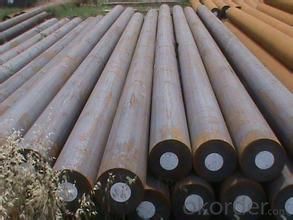
Quality Assurance:
1. We will strictly inspect our production that we sold according to the customer’s request.
2. Our steel reaches international quality standards.
3. Quality should be in conformity with the specification of the manufacturer. Quantity and packing conditions should be in conformity with the term in the contract.
4. Should the packing found damaged, the buyer has the right to claim to the seller
- Q: Can special steel be used for making cutting tools?
- Indeed, cutting tools can be crafted from special steel. Specifically engineered and produced, special steel alloys like tool steel possess exceptional attributes such as wear resistance, hardness, toughness, and stability at high temperatures. Consequently, they are exceptionally suited for the production of cutting tools. These tools encompass a wide range of instruments, including saw blades, drills, milling cutters, knives, and other sharp-edged implements utilized across various industries such as manufacturing, construction, metalworking, woodworking, and more. The distinctive properties of special steel enable cutting tools to maintain their sharpness, withstand substantial cutting forces, and operate with utmost effectiveness and efficiency over extended durations.
- Q: How is shock-resistant alloy steel used in the production of impact-resistant parts?
- Shock-resistant alloy steel is used in the production of impact-resistant parts to enhance their durability and toughness. This type of steel is specifically designed to withstand high impact forces, making it ideal for applications where parts are subjected to intense shock or sudden impact loads. By incorporating shock-resistant alloy steel into the manufacturing process, impact-resistant parts can better absorb and distribute the energy from impacts, thereby reducing the risk of damage or failure.
- Q: What are the requirements for special steel used in robotic applications?
- Optimal performance and reliability of robotic applications necessitates special steel that meets specific key requirements. These requirements encompass: 1. Exceptional strength: The steel utilized in robotic applications must possess outstanding strength properties to endure the stresses and loads encountered during robotic operations. It should exhibit superior tensile and yield strength to ensure structural integrity and prevent failure when subjected to heavy loads. 2. Resistance to wear: The steel employed in robotic applications should demonstrate high resistance to wear, enabling it to withstand repetitive motions, sliding, and abrasive contact with different surfaces. This characteristic minimizes wear and tear, thereby extending the lifespan of robotic components. 3. Protection against corrosion: Robotic applications often involve exposure to diverse environments, including moisture, chemicals, and other corrosive agents. Consequently, the special steel employed must possess excellent corrosion resistance to prevent degradation and maintain optimal performance over time. 4. Toughness: Good toughness is essential for special steel, allowing it to absorb energy and resist fracture or cracking. This attribute is crucial to ensure that the steel can withstand sudden shocks or impacts without catastrophic failure, thereby enhancing the safety and reliability of the robotic system. 5. Machinability: Robotic components often necessitate intricate shapes and precise dimensions. Therefore, the special steel used must exhibit good machinability, enabling easy cutting, shaping, and forming without excessive tool wear or manufacturing difficulties. 6. Heat resistance: Some robotic applications involve exposure to high temperatures, such as in welding or metalworking processes. Hence, it is imperative for the special steel to possess good heat resistance, maintaining its mechanical properties and structural integrity even under elevated temperatures. 7. Magnetic properties: Certain robotic applications may require non-magnetic steel to prevent interference with electromagnetic sensors or systems. Consequently, special steel with low magnetic permeability is often preferred for such applications. By fulfilling these requirements, special steel employed in robotic applications can deliver the necessary strength, durability, and performance essential for efficient and reliable robotic operations across various industries, including manufacturing, healthcare, and exploration.
- Q: What are the properties of high-strength tool steel?
- High-strength tool steel typically possesses excellent hardness, toughness, wear resistance, and ability to retain its shape even under high temperatures and pressures. It is known for its durability, ability to withstand heavy loads, and resistance to deformation, making it ideal for demanding applications in tooling and machining.
- Q: What are the different grades of special steel?
- Special steel is classified into various grades based on its chemical composition, physical properties, and intended use. Some common grades include tool steel, stainless steel, alloy steel, and high-speed steel. These grades offer unique characteristics and are utilized in different industries such as manufacturing, construction, automotive, and aerospace.
- Q: What are the properties of high-temperature alloy steel?
- High-temperature alloy steel possesses properties such as excellent heat resistance, high strength, good oxidation and corrosion resistance, and the ability to maintain mechanical properties at elevated temperatures. It is also known for its resistance to thermal fatigue, creep, and thermal shock, making it suitable for applications in high-temperature environments.
- Q: How is special steel used in the textile industry?
- Special steel is commonly used in the textile industry for the production of various machinery and equipment such as needles, pins, and wire guides. These steel components are essential in processes like knitting, weaving, and sewing, as they provide durability, strength, and precision, ensuring smooth operation and quality output in textile manufacturing.
- Q: What are the different non-destructive testing methods used for special steel?
- Some different non-destructive testing methods used for special steel include ultrasonic testing, magnetic particle testing, liquid penetrant testing, radiographic testing, and eddy current testing. These methods help to detect and evaluate any defects or abnormalities in the steel without causing any damage to the material.
- Q: Can special steel be used in the production of turbine blades?
- Yes, special steel can be used in the production of turbine blades. Special steel alloys, such as nickel-based superalloys, are commonly used due to their high strength, heat resistance, and excellent corrosion resistance, making them suitable for the demanding conditions and extreme temperatures experienced in turbine engines.
- Q: What are the specific requirements for special steel used in the marine industry?
- The specific requirements for special steel used in the marine industry include high corrosion resistance, ability to withstand extreme temperatures and pressure, superior strength and toughness, good weldability, and resistance to fatigue and cracking. Additionally, the steel should be able to withstand exposure to seawater and other harsh environmental conditions without deteriorating or causing any negative impact on the marine ecosystem.
Send your message to us
Grade AISI6150 CNBM Hot Rolled Spring Steel bar
- Loading Port:
- Shanghai
- Payment Terms:
- TT or LC
- Min Order Qty:
- 25 m.t.
- Supply Capability:
- 10000 m.t./month
OKorder Service Pledge
OKorder Financial Service
Similar products
Hot products
Hot Searches
Related keywords













